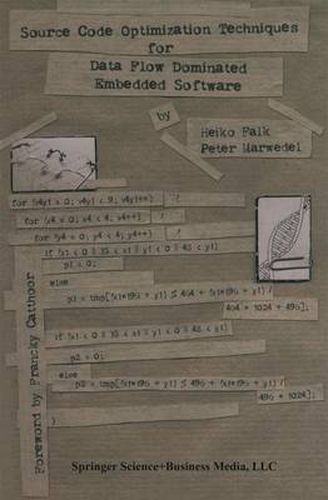Readings Newsletter
Become a Readings Member to make your shopping experience even easier.
Sign in or sign up for free!
You’re not far away from qualifying for FREE standard shipping within Australia
You’ve qualified for FREE standard shipping within Australia
The cart is loading…






This title is printed to order. This book may have been self-published. If so, we cannot guarantee the quality of the content. In the main most books will have gone through the editing process however some may not. We therefore suggest that you be aware of this before ordering this book. If in doubt check either the author or publisher’s details as we are unable to accept any returns unless they are faulty. Please contact us if you have any questions.
The building blocks of today’s embedded systems-on-a-chip (SoC) are complex IP components and programmable processor cores. This means that more and more system functionality is implemented in software rather than in custom hardware motivating the need for highly optimized embedded software. Source Code Optimization Techniques for Data Flow Dominated Embedded Software is the first contribution focusing on the application of optimizations outside a compiler at the source code level. This book covers the following areas: - Several entirely new techniques are presented in combination with efficient algorithms for the most important ones- Control flow analysis and optimization of data-dominated applications is one of the main contributions of this book since this issue remained open up to now- Using real-life applications, large improvements in terms of runtimes and energy dissipation were achieved by the techniques presented in this book. Detailed results for a broad range of processors including DSPs, VLIWs and embedded RISC cores are discussed. Source Code Optimization Techniques is mostly self-contained and requires only a basic knowledge in software design. It is intended to be a key reference for researchers, design engineers and compiler / system CAD managers in industry who wish to anticipate the evolution of commercially available design tools over the next few years, or to make use of the concepts of this book in their own research and development.
$9.00 standard shipping within Australia
FREE standard shipping within Australia for orders over $100.00
Express & International shipping calculated at checkout
This title is printed to order. This book may have been self-published. If so, we cannot guarantee the quality of the content. In the main most books will have gone through the editing process however some may not. We therefore suggest that you be aware of this before ordering this book. If in doubt check either the author or publisher’s details as we are unable to accept any returns unless they are faulty. Please contact us if you have any questions.
The building blocks of today’s embedded systems-on-a-chip (SoC) are complex IP components and programmable processor cores. This means that more and more system functionality is implemented in software rather than in custom hardware motivating the need for highly optimized embedded software. Source Code Optimization Techniques for Data Flow Dominated Embedded Software is the first contribution focusing on the application of optimizations outside a compiler at the source code level. This book covers the following areas: - Several entirely new techniques are presented in combination with efficient algorithms for the most important ones- Control flow analysis and optimization of data-dominated applications is one of the main contributions of this book since this issue remained open up to now- Using real-life applications, large improvements in terms of runtimes and energy dissipation were achieved by the techniques presented in this book. Detailed results for a broad range of processors including DSPs, VLIWs and embedded RISC cores are discussed. Source Code Optimization Techniques is mostly self-contained and requires only a basic knowledge in software design. It is intended to be a key reference for researchers, design engineers and compiler / system CAD managers in industry who wish to anticipate the evolution of commercially available design tools over the next few years, or to make use of the concepts of this book in their own research and development.